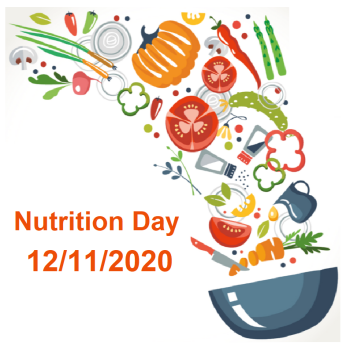Facing cancer: eat and move!
Press release (12/11/2020)
Facing cancer: eat and move!
Brussels, November 12, 2020 – On 12 November, the Jules Bordet Institute, the Belgian reference centre in the fight against cancer, is participating in Nutrition Day. The occasion to again stress the essential link between healthy eating combined with regular physical exercise and treatment against cancer. Eat and move: two health "assets" that are in your hands when facing this disease.
 Nutrition Day, an international audit of the nutrition of hospitalised patients – figures
Nutrition Day, an international audit of the nutrition of hospitalised patients – figures
Initiated in 2006 by Vienna University and the European Society for Clinical Nutrition and Metabolism (ESPEN), every year Nutrition Day undertakes a vast international audit (64 countries) inside hospitalisation units. Carried out by dietetic and nutrition teams, this audit looks at the nutritional status of patients before and after a period of hospitalisation and its impact on mortality in the 30 days following the audit.
The results raise serious questions. The analysis of the figures since 2006 shows that in Belgium 50% of patients eat less during the week prior to hospitalisation, 40% of patients experience an involuntary weight loss during the 3 months prior to hospitalisation, and 14% of patents eat nothing during their hospitalisation.
The follow-up of patients 30 days following the audit shows an increased mortality (2% to 8%) among patients who lost weight or ate less before and/or during their hospitalisation. This was observed among all age groups but is more significant among elderly subjects. Findings that confirm the importance of nutritional care when treating patients.
As a cancer patient, watch out for involuntary weight loss!
When facing cancer it is important to consult a dietician so as to adopt an appropriate diet that makes it possible to control weight increases and losses. Involuntary weight loss is often observed in patients, sometimes immediately following diagnosis. The causes are many: loss of appetite, eating difficulties and/or digestive intolerance, changes to the metabolism linked to the tumour, side effects of the treatment, anxiety or a tendency to depression, etc. This weight loss then results in fatigue and reduced tolerance to the medication and can even adversely affect the patient's vital prognosis. This is why it is important to inform your doctor or dietician of any involuntary weight loss. In general, it is always recommended to follow a varied and balanced diet, consisting of vegetables and fruit, proteins (of animal or vegetable origin) and an adequate calorie intake. In the case of cancer, it is important to cover nutritional needs (nutrients and vitamins) to maintain an adequate weight, fight the disease and better tolerate treatments.
How does physical exercise help to live with the disease?
For a long time physical exercise was regarded as inadvisable for people who are ill and who need to rest as much as possible. It has now been shown that being physically active brings many benefits. It helps increase the assimilation of proteins in the muscles and to maintain muscular mass that is essential at all times but especially when you are ill. Physical activity also has a positive effect on hormones and the immune system. These are factors that will increase tolerance to the treatment and facilitate recovery. Of course this physical activity needs to be adapted to each patient depending on his or her illness, treatment and age.
For more information on Nutrition Day, go to www.nutritionday.org
- Contacts Presse (Institut Jules Bordet)
- Ariane van de Werve
- GSM : +32 486 17 33 26
- E-mail : ariane.vandewerve@bordet.be
- Ariane van de Werve